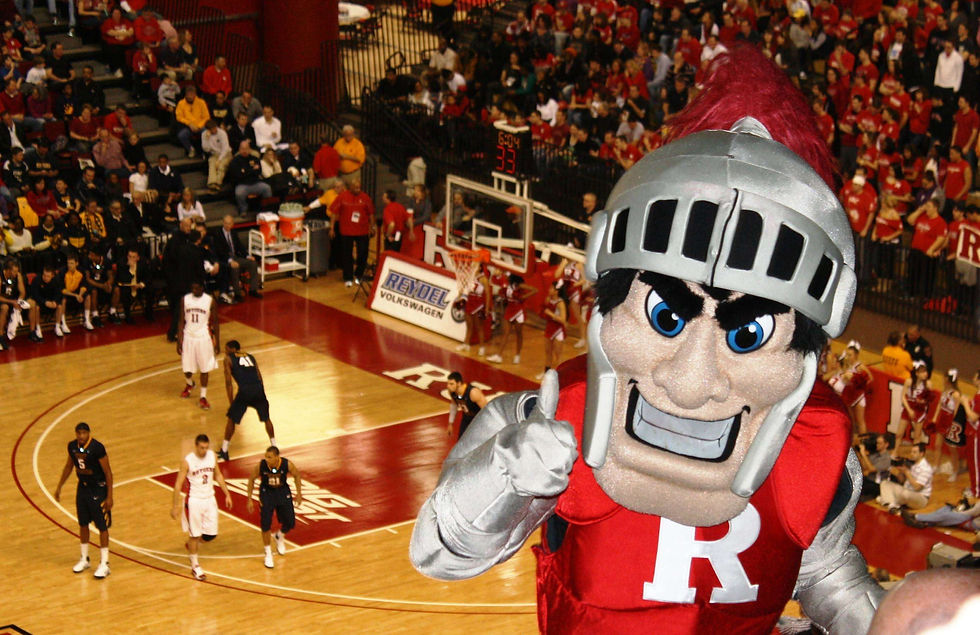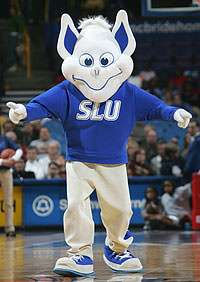Does Your College Really Need a Large, Foam, Third-Gender Mascot? Or Any Mascot at All?
- OurStudio

- May 8, 2015
- 3 min read

As a proud graduate (Class of '85!) of Rutgers, the State University of New Jersey and Milton Friedman's alma mater, I keep tabs on the school's generally disappointing sports teams. Reader Jimmy sent me this story about the school's sad-sack mascot, the Scarlet Knight, with a note reading, "I thought you might want to be sick after lunch. Kind regards…"
Indeed. It turns out the oversized, foam-head Scarlet Knight is unbearably male and caucasian in his gender, features, and skin hue. From the school's newspaper, The Daily Targum (where I cut my teeth as a book reviewer, arts writer, and substance abuser):
The Rutgers University Student Assembly recently passed a bill intended to support ethnic and gender diversity by adding multiple Scarlet Knights that could be black, Latino, Asian, female or third gender in addition to the existing Caucasian Scarlet Knight, said Emmet Brennan, student assembly parliamentarian. "What we were thinking — the way the bill's laid out — it's not defined that we need an Asian knight, a black knight, a Latino knight," said Brennan, a School of Environmental and Biological Sciences first-year student. "That we would really leave it up to the different student organizations … and basically the student body as a whole to determine how many knights they'd like and what these knights would represent." Brennan said he founded the idea behind the bill working as a press box server at a football game, where he noticed the mascot had blue eyes and light skin. "This does not seem right," Brennan said. "Our mascot does not represent how diverse we are as a school."

Before we get too lost in the weeds, let's agree that not only is the Kabuki-style Scarlet Knight mascot poor in execution but in concept. Why scarlet rather than red? Why a knight, especially for a state school in New Jersey, a place not typically associated with nobility? Until the mid-1950s (and back when the school was still all-male), the mascot was a "Chanticleer," essentially an oversized rooster, so it's not like the place has ever been brimming over with great ideas….
But there I go, wading into the weeds…. As much as I would love to see Rutgers be represented by the first "third gender" mascot in Division I (well maybe the second, if the chromosone test on the St. Louis University Billiken proves what we all figure is true), I would much rather see Rutgers distinguish itself by killing its ridiculously gigantic subidizing of its athletics programs. Come on, RU, be the first flagship state research university to just say, Fuck it—we're actually going to focus on research and learning.
As USA Today tallies things (based on public information that state schools must make available), students and New Jersey taxpayers subsidize fully 60 percent of the amount of money Rutgers spends on its athletic department and sports programs. The subsidy alone is about $47 million a year that could either be going to actual academic pursuits or just not being spent at all, thereby lessening the load on the people paying for the university. Go here for a list of how much universities spend on sports teams above and beyond what they take in via ticket sales, TV contracts, and the like. Despite what you hear, exceptionally few schools have teams that cover their own costs, much less kick money into the general revenue till. (The list doesn't cover private universities, as they aren't required to make the necessary documents public.)
Years ago, Milton Friedman joined a bunch of Rutgers faculty and alum who called for either ending the school's sports teams altogether or de-emphasizing them. Yes, a thousand time yes, to that. As the NCAA itself has found, there is no evidence of long-lasting connection between a college's sports programs and the quality or quantity of its applicant pool or its academic reputation (think M.I.T., Caltech, and University of Chicago, among others). Schools ultimately prosper by having excellent faculty who attract excellent students.
I love watching college sports but they have nothing to do with the primary mission of any university, which is the production of knowledge and, to a lesser but still important degree, the education of the young. But if Rutgers—or any other college for that matter—really wants to do something to represent its student body, the first, best thing they can do is get rid of the reason for mascots rather than multiply their races and genders.




Comments